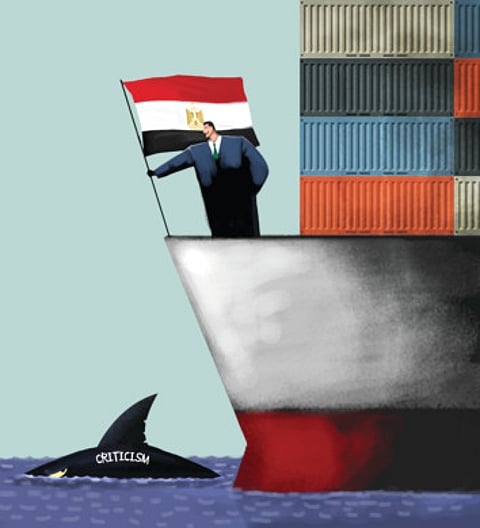Mixed response over Suez Canal project
Egypt may have its problems, both economic and in terms of threats from radical groups, but this year the smile count is visibly higher, especially after completion of the ambitious initiative

I’m forced to reach the conclusion that certain sectors of the English-language western media would come up with negative comments about Egyptian President Abdul Fattah Al Sissi, even if he singlehandedly constructed a replica of the Giza Pyramids, block by block, on the moon. By contrast, the French, Italian and Spanish papers overall ran congratulatory headlines.
Even as the Egyptian people swamped the streets all over the country on Thursday dancing, and ululating to praise the launching of the ‘New Suez Canal’ — constructed in just one year, whereas all the experts predicted it would take at least three — certain publications went out of their way to denigrate the achievement, and judging by the fierce comments posted by Egyptians, they’re not in the mood for insult.
And who can blame them when the $8.5 billion (Dh31.2 billion) projected was miraculously funded by the people themselves in little more than two days!! Much more than just a waterway, it’s engendered a sense of national pride and love of country; it’s also greatly heightened their president’s credibility. A year ago, he told the nation that it would be completed before August 6th, 2015 and so it was.
An article on an Egyptian website headed ‘Loving Egypt, a newfound zeal’ gets it right — and I say that as someone who’s lived in the country for ten years and lived through two revolutions.
“A rather bizarre and unexpected change is occurring among Egyptians: they may have always cared about Egypt, but now they exhibit that love in a distinct and zealous fashion,” writes the author, who says the president’s love for Egypt is “infectious”.
I’ve noticed the same trend. Yesterday, I can’t count the number of excited Egyptians I bumped into exuding pride at their country’s “gift to the world”. Egypt has its problems, both economic and in terms of threats from radical groups, but this year the smile count is visibly higher.
Unfortunately, media critics don’t see that — or rather, refuse to do so, preferring to publish quotes from known pro-Islamists or revolution-addicts, such as British-Egyptian Sarah Carr, who wrote an article dripping with venomous sarcasm published on the Foreign Policy website. They invariably ignore the fact that in a region fraught with conflicts and terrorism, Egypt stands strong and is committed to standing shoulder to shoulder with those Gulf States credited with helping to save the country from a ‘failed state’ status.
Margaret, an expat, who lives in Cairo, summed this up with the words, “How sad that the world refuses to let Egypt have its day of glory! I’ve read the negative press articles and can only believe that the rest of the world wishes Egypt to fail in its quest to join the 21st century... You have to live her to realise that we are living and achieving the dream.”
To be fair, the media response was mixed. Reuters described the celebratory atmosphere and quoted Britain’s Defence Secretary Michael Fallon characterising the project as “a modern wonder”. France 24’s website hailed “the canal expansion” as “the centrepiece of a grand agenda by Al Sissi to cement his tenure as the man who brought stability and prosperity to Egypt...”
The naysayers include the Economist that acknowledges “A bigger, better Suez” canal but goes on to label it “a questionable endeavour at a time when the government is struggling to provide adequate services to its citizens” before negating that argument by pointing out that Egypt “plans to turn the whole canal zone into a giant logistical, ship-serving and manufacturing hub”.
Indeed, Russian and Chinese investors are queuing to get involved. Russian Prime Minister Dmitry Medvedev has announced that Russia is ready to help build the new zone which aims to increase trade and provide Egyptians with new jobs.
Bloomberg unearthed just about everything that could bar the way to Al Sissi’s promise of increased canal revenues; David Kirkpatrick, writing in the eternally condemnatory New York Times lived up to readers’ expectations. His credibility was shot by his statement that on the day of the Canal launch, “the streets of Cairo were empty”.
Is he suggesting that the crowds who gathered in the Capital’s iconic squares and the cars adorned with flags were photoshopped? The New York Times further capitalised on the moment to publish a sympathetically-slanted piece on the Brotherhood.
Business Insider refers to Al Sissi as “an authoritarian-minded president”, without giving context. Yes, President Al Sissi is a strong leader; he has had to be in order to guide the country safely through an emergency situation with the potential to render Egypt in a similar category to Syria, Iraq, Libya and Yemen.
Were human rights on the top of the US list of priorities during the Second World War when thousands of Japanese-Americans were forced into camps or, again, post 9/11 when thousands of Muslims were rounded up without access to lawyers?
The naysayers omit to write that he was democratically elected by a landslide and parliamentary elections — delayed over the Constitutional Court’s ruling on electoral districts — are scheduled for October.
When the Obama administration, Britain’s 10 Downing Street and several European states are seeking to mend bridges with Egypt, acknowledging the country’s strategic value and recognising its president as a crucial ally in their fight against terror, unfairly critical messages from their whining, doom-and-gloom media are sounding ever more stale.
Linda S. Heard is an award-winning British political columnist and guest television commentator with a focus on the Middle East.



